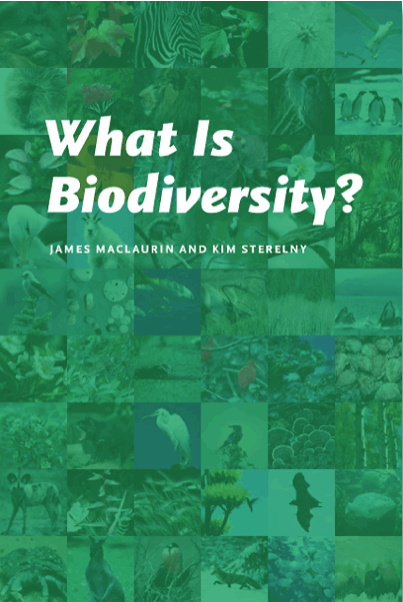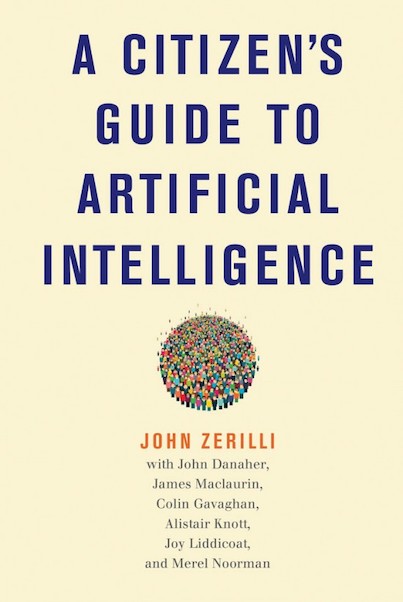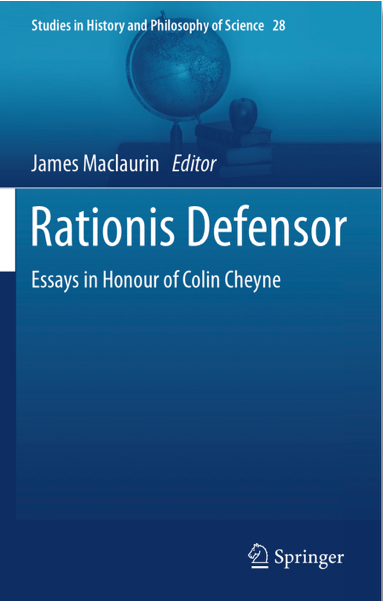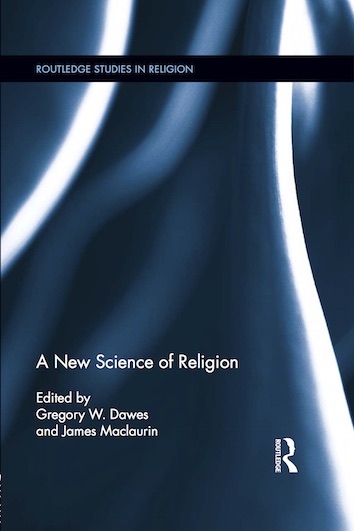James is a philosopher of science with particular interest in computing and information science (particularly artificial intelligence and it’s impact on humanity) and in the life sciences (especially ecology and evolutionary biology).
He is Director of the University of Otago’s Centre for Artificial Intelligence and Public Policy. His other research centres on Philosophy of Biology (where he has written on innateness, fitness, theoretical morphology, and biological diversity) and on the application of evolutionary principles in other domains such as philosophy of time, computer science and economics. He has also written on metaphilosophy.

From 2013 to 2016 James was the general editor and project co-ordinator for the HelpMePublish Project, a tech startup funded through Otago Innovation Ltd. The project aimed to help academics avoid publication pitfalls and increase their readership by supplying better and more detailed information about journals (the app is discussed at length in this article in Nature). The project has now wound up.
AUTHORED BOOKS
- Zerilli, J., Danaher, J., Maclaurin, J., Gavaghan, C., Knott, A., Liddicoat, J., and Noorman, M. E. (February 2021) A Citizen's Guide to Artificial Intelligence, Cambridge Massachusetts, MIT Press. (Review in Forbes Magazine, discussion and excerpt in Engadget)
- Maclaurin, J., and Sterelny, K. (2008). What is Biodiversity? Chicago: University of Chicago Press (Metascience review).
- Dawes, G. W., and Maclaurin, J. (Eds.). (2013). A New Science of Religion. New York: Routledge.
- Maclaurin, J. (Ed.). (2012). Rationis Defensor: Essays in Honour of Colin Cheyne. Dordrecht: Springer.
- Gavaghan, C., Knott, A., Maclaurin, J. (2021) The Impact of Artificial Intelligence on Jobs and Work in New Zealand. New Zealand Law Foundation. (full text available here)
- Zerilli, J., Knott, Al, Maclaurin, J., and Gavaghan, C. (2019) "Algorithmic decision-making and the control problem" Minds and Machines, 29 (4), 555-578 (full text available here).
- Zerilli, J., Knott, Al, Maclaurin, J., and Gavaghan, C. (2019) "Transparency in algorithmic and human decision-making: Is there a double standard?" Philosophy & Technology 32(4), 661-683. doi: 10.1007/s13347-018-0330-6
- Walsh, T., Levy, N., Bell, G., Elliott, A., Maclaurin, J., Mareels, I.M.Y., Wood, F.M., (2019) The effective and ethical development of artificial intelligence: An opportunity to improve our wellbeing. Report for the Australian Council of Learned Academies, (full text available here)
- Gavaghan, C., Knott, A., Maclaurin, J., Zerilli, J. and J. Liddicoat (2019) Government Use of Artificial Intelligence in New Zealand, New Zealand Law Foundation, Wellington. (full text available here)
- Bioheritage NSC Bioethics panel (2019). Predator Free New Zealand: Social, Cultural, and Ethical Challenges. BioHeritage National Science Challenge. (full text available here)
- Liddicoat, J., Gavaghan, C., Knott, A., Maclaurin, J. & Zerilli, J. (2019) The use of algorithms in the New Zealand public sector. New Zealand Law Journal, pp. 26-36.
- Higham, J.E.S., Ellis, L. & Maclaurin, J. (2019). Tourist aviation emissions: A problem of collective action. Journal of Travel Research 58(4), 535–548. doi: 10.1177/0047287518769764
- Whigham, P., Dick, G., & Maclaurin, J. (2017) On the mapping of genotype to phenotype in evolutionary algorithms. Genetic Programming and Evolvable Machines doi: 10.1007/s10710-017-9288-x
- Whigham, P., Dick, G., & Maclaurin, J. (2017) Just because it works — a response to comments on "On the mapping of genotype to phenotype in evolutionary algorithms". Genetic Programming and Evolvable Machines doi: 10.1007/s10710-017-9289-9
- Maclaurin, J. (2017). Is Biodiversity a Natural Quality? In J. Garson, A. Plutynski and S. Sarkar (Eds.), The Routledge Handbook of Philosophy of Biodiversity. New York: Routledge. pp. 56 - 68.
- Waa, A., Maclaurin, J., Hoek, J., & Edwards, R. (2016). An analysis of the logic and framing of a tobacco industry campaign opposing standardised packaging legislation in New Zealand. Tobacco Control. Available now in Online First. doi: 10.1145/2739480.2754784
- Maclaurin, J., and Lean, C. (2016). The Value of Phylogenetic Diversity. In R. Pellens and P. Grandcolas (Eds.), Biodiversity Conservation and Phylogenetic Systematics: Species Protection in an Extinction Crisis. New York: Springer. pp. 19-38.
- Whigham, P., Dick, G., Maclaurin, J., and Owen, C. (2015). Examining the “Best of Both Worlds” of Grammatical Evolution. Paper presented at the Proceedings of the 2015 Genetic and Evolutionary Computation Conference, Madrid. doi: 10.1145/2739480.2754784
- Maclaurin, J., and Dyke, H. (2013). What Shall we do with Analytic Metaphysics?: A Response to McLeod and Parsons. Australasian Journal of Philosophy, 91(1), 179-182. doi: 10.1080/00048402.2012.762029
- Maclaurin, J., and Cochrane, T. (2013). The Purpose of Progress: A Response to Schubert. Journal of Bioeconomics. doi: 10.1007/s10818-012-9150-4
- Dyke, H., and Maclaurin, J. (2013). Evolutionary Explanations of Temporal Experience. In A. Bardon and H. Dyke (Eds.), A Companion to the Philosophy of Time (pp. 521-534). Oxford: Wiley-Blackwell.
- Dawes, G. W., and Maclaurin, J. (2013). What is religion?: Identifying the Explanadum. In G. W. Dawes & J. Maclaurin (Eds.), A New Science of Religion. New York: Routledge, pp. 11-25.
- Dawes, G. W., and Maclaurin, J. (2013). Introduction. In G. W. Dawes & J. Maclaurin (Eds.), A New Science of Religion. New York: Routledge, pp. 1-10.
- Maclaurin, J., and Dyke, H. (2012). What is Analytic Metaphysics For? Australasian Journal of Philosophy, 90(2), 291 - 306. doi: 10.1080/00048402.2011.587439
- Maclaurin, J., and Cochrane, T. (2012). Evolvability and Progress in Evolutionary Economics. Journal of Bioeconomics, 14(2), 101-114. doi: 10.1007/s10818-011-9116-y
- Maclaurin, J. (2012). Universal Darwinism: Its Scope and Limits. In J. Maclaurin (Ed.), Rationis Defensor: Essays in Honour of Colin Cheyne (pp. 43 - 56). Dordrecht: Springer.
- Maclaurin, J. (2011). Commentary on “The transmission sense of information” by Carl T. Bergstrom and Martin Rosvall. Biology and Philosophy, 26(2), 191-194. doi: doi: 10.1007/s10539-010-9233-3
- Maclaurin, J. (2011). Against Reduction: A Critical Notice of Molecular Models: Philosophical Papers on Molecular Biology by Sahotra Sarkar. Biology and Philosophy, 26(1), 151-158. doi: 10.1007/s10539-009-9183-9
- Maclaurin, J. (2006). The Innate / Acquired Distinction. In S. Sarkar and F. Pfeifer (Eds.), The Philosophy of Science: An Encyclopedia (pp. 394-400). New York: Routledge.
- Maclaurin, J. (2003). The Good, the Bad and the Impossible. Biology and Philosophy, 18(3), 463 - 476. doi: 10.1023/A:1024139705900
- Maclaurin, J. (2002). The Resurrection of Innateness. Monist, 85(1), 105 - 130./li>
- Dyke, H., and Maclaurin, J. (2002). 'Thank Goodness That's Over': The Evolutionary Story". Ratio, XV(3), 276 - 292. doi: 10.1111/1467-9329.00191
- Maclaurin, J. (2001). Fitness: Philosophical Problems in the Encyclopedia of Life Sciences (Vol. 7, pp. 208-212). London: Nature Publishing Group.
- Maclaurin, J. (1998). The metaphysics of biodiversity. PhD Thesis, Australian National Univeristy.
- Maclaurin, J. (1998). How to Defeat Complexity: A Critical Notice of "Complexity and the Function of Mind in Nature" by P. Godfrey-Smith. Australasian Journal of Philosophy, 76, 491 - 501. doi: 10.1080/00048409812348601
- Maclaurin, J. (1998). Reinventing Molecular Weismannism: Information in Evolution. Biology and Philosophy, 13, 37 - 59. doi: 10.1023/A:1006573021270
- Maclaurin, J. (1998). Information in Evolution. MA Thesis, Victoria University of Wellington.



- Maclaurin, J. (2008). Teleosemantics: New Philosophical Essays by G. MacDonald and D. Papineau. (review) Mind. doi: 10.1093/mind/fzn136
- Maclaurin, J. (2006). "The Evolution of Darwinism" by Timothy Shanahan (review). Philosophical Books, 47(2), 191 - 192.
- Maclaurin, J. (2002). Why Minds Evolve: A Review of "The Evolution of Agency and Other Essays" by K. Sterelny, Metascience, 11(1), 127-130.
- Maclaurin, J. (2001). "Philosophy of Biology" by E. Sober (review). Australasian Journal of Philosophy, 73(1), pp. 166-8.
- Maclaurin, J. (2001). "Sex and Death" by K. Sterelny and P. E. Griffiths (review). New Zealand Science Review, 58(1), p. 34.
For more publications and archived texts see my PhilPapers page. You can follow me on Academia.edu.
